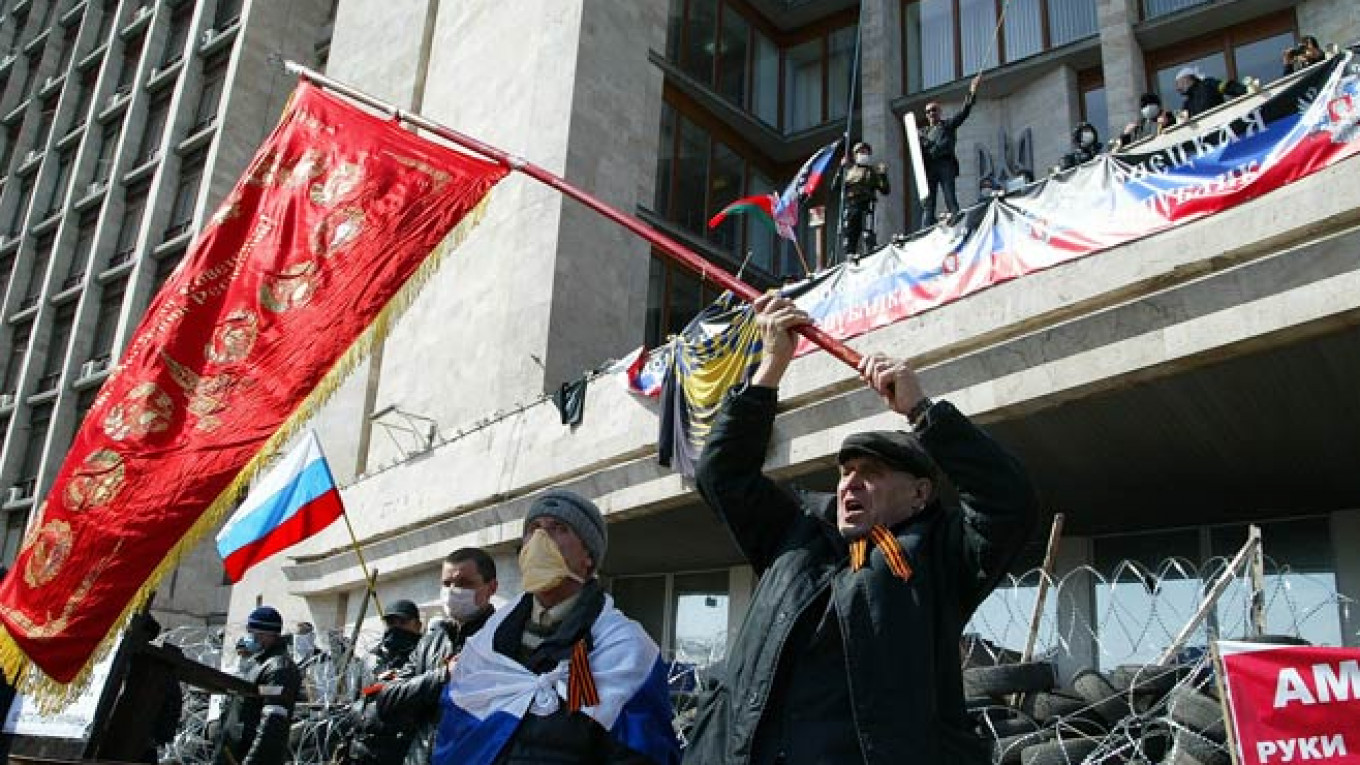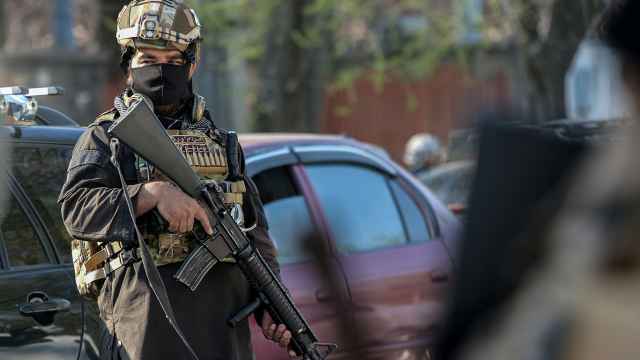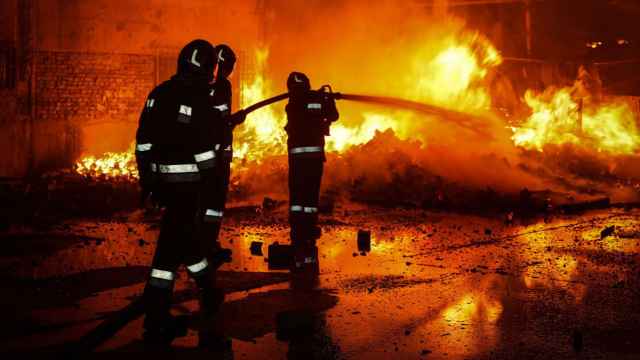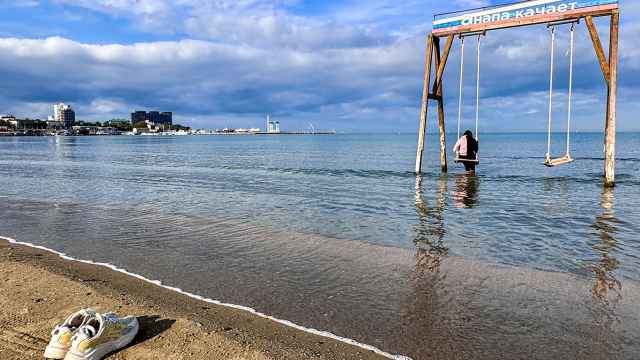Anti-government protesters in the Ukrainian city of Donetsk on Monday announced a referendum on joining Russia set for May 11 and called on Russian "peacekeepers" to intervene in the country, triggering fears of a "Crimean scenario" for Ukraine's eastern regions.
The move followed the seizure of the regional administration buildings in Donetsk and Kharkiv and the security service building in Luhansk by pro-Russian protesters on Sunday. The takeovers marked the biggest success of pro-Russian activists in a series of protests that have shaken eastern Ukraine since pro-Kremlin President Viktor Yanukovych was ousted in late February and new leaders appointed.
The protests also come at a time of heightened tensions between Russia and the West over what European and U.S. leaders see as Russia's illegal seizure of Crimea, which followed a referendum after appeals for Russian intervention similar to those now being made in Donetsk, Kharkiv and Luhansk.
While president Vladimir Putin was accused by Ukrainian Interior Minister Arsen Avakov of orchestrating the "separatist unrest" in Donetsk, Luhansk and Kharkiv, the president placed the blame elsewhere.
Addressing Ukrainian and Crimean affairs at a meeting of the Federal Security Service on Monday, Putin urged the service to crack down on what he described as the "destructive activities" of nongovernmental organizations.
"This happened in Ukraine, when nationalist, neo-Nazi groups and militants that were behind the anti-constitutional coup d'etat were financed from abroad through nongovernmental organizations," he said.
The FSB would now "face the task of preventing former criminals and representatives of various radical and extremist movements from getting into government bodies [in Crimea]," he said.
In Donetsk, the protesters set up a "people's council" on Monday that declared the creation of a "republic of Donetsk" and set a referendum on becoming independent and joining Russia. Pro-Russian demonstrators also seized the security service building in the city on Monday.
In Kharkiv, police seized control of the regional administration building on Monday morning but some pro-Russian activists remained inside and refused to leave. Pro-Kiev demonstrators that support Ukraine's new government also held a rally in the city but were dispersed by their pro-Russian opponents after violent clashes.
Protesters set up barricades in Donetsk, Luhansk and Kharkiv, piling up tires and preparing Molotov cocktails in a fashion similar to that of the anti-Yanukovych protests in Kiev earlier this year.
As tensions escalated, Crimean Prime Minister Sergei Aksyonov said on Twitter that Yanukovych had arrived in Donetsk, though he cautioned that the report had not been confirmed.
Senior Ukrainian officials headed to eastern regions to deal with the protests. Interior Minister Arsen Avakov went to Kharkiv, while First Deputy Prime Minister Vitaly Yarema visited Donetsk, and Andrei Paruby, secretary of the Security Council, and Security Service head Valentin Nalivaichenko went to Luhansk. Yuliya Tymoshenko, a leading candidate in the May 25 presidential election, flew to Donetsk.
The relatively easy takeover of the administrative buildings by demonstrators in the three cities prompted speculation by analysts that local authorities and police may have been complicit in the riots and were cooperating with the Kremlin.
Vladimir Fesenko, head of Ukraine's Penta think tank, said that powerful Donetsk-based tycoon Renat Akhmetov, a key ally of Yanukovych, could be behind the protests.
"Akhmetov is playing both sides," he said, explaining that Akhmetov professed loyalty to the Kiev government while at the same time fomenting anti-government protests.
"He has had the Donetsk region under his control for 15 years," Fesenko said.
Some observers said the Kremlin was also involved in the protests and that the events indicated a looming Russian invasion of eastern Ukraine after the occupation and annexation of Crimea by Russia last month.
"Yesterday the second stage of a special Russian operation began, the aim of which is to destabilize the situation in the state, overthrow the Ukrainian authorities, disrupt the election and tear our country apart," acting President Oleksander Turchinov said, adding that "anti-terrorism" measures would be used against protesters in eastern Ukraine.
Russia's Foreign Ministry, however, hit back with a statement and demanded that the Ukrainian authorities in Kiev "stop … blaming all the troubles of today's Ukraine on Moscow."
The statement said that if the political forces in Ukraine "that call themselves the Ukrainian government" continue to exhibit "an irresponsible attitude to the fate of the country," the nation will face more crises and troubles.
Meanwhile, Daniel Baer, the U.S. ambassador to the Organization for Security and Cooperation in Europe, said Monday that Russia had amassed tens of thousands of troops near the border with Ukraine "not in their normal peacetime positions or garrisons," Reuters reported. He called on Moscow to take steps to de-escalate the situation.
Fears of an invasion were also fueled by a report published Sunday on the Dnepr.com news portal saying that a subversive group of seven men had tried to storm a military unit in Dnipropetrovsk. The attackers were detained, according to that report.
Former Georgian President Mikheil Saakashvili, a long-time critic of the Kremlin, also warned of an imminent invasion.
"Three days ago I predicted in an article that regional administrations in the eastern regions would be seized," he said on Facebook on Sunday. "If the subversive groups hold on to them for 48 hours, the Russian Army will invade. This scenario is the same as in Crimea — first a rally is held, and then, if it does not work, [administrative buildings] are seized, and then Russia invades."
Andrei Illarionov, a former aide of President Vladimir Putin and currently a member of the opposition, shared this view, saying that a Russian invasion was inevitable because popular support for accession to Russia in southeastern Ukraine was lacking.
"That is why the only way for Putin and Putinists to achieve their goals in the south and east of Ukraine is to use brute force," Illarionov wrote in a LiveJournal post Monday. "To seize administrative buildings, assemble lawmakers under the barrel of a gun and 'elect' 'popular leaders' and 'people's governments.' And invite Russian troops."
Fesenko agreed with Illarionov's statement that although separatist sentiment existed in eastern regions, most people did not support joining Russia. Fesenko agreed with Illarionov that, though separatist sentiment existed in eastern regions, most people did not support joining Russia. He cited a February poll according to which only 33.2 percent of respondents in the Donetsk region, 24.1 percent in the Luhansk region and 15.1 percent in the Kharkiv region backed the idea.
This represents a sharp contrast with Crimea, where more people were believed to support joining Russia last month. According to a poll taken in February by the Kiev International Sociology Institute, 41 percent of Crimea's population supported joining Russia, and 96.8 voted for accession to Russia in the March 16 referendum, according to the official results.
Though most people in Ukraine's eastern regions are Russian-speaking, ethnic Ukrainians accounted for 56.9 percent in the Donetsk region, 70.7 percent in the Kharkiv region and 58 percent in the Luhansk region, as opposed to just 24 percent in Crimea, according to the 2001 census, which was the last one conducted.
Another difference with Crimea is that in eastern Ukraine a war with Russia is much more likely than a peaceful takeover by Russian troops, Fesenko said. The Ukrainian Army is not well-prepared for such a war, he said, adding that a guerilla war may also be launched in such a case.
A Russian soldier shot dead a Ukrainian naval officer in eastern Crimea, Ukraine's Defence Ministry said on Monday, the second Ukrainian death reported since Russia took control of the Black Sea peninsula.
Russian President Vladimir Putin has praised the military's largely bloodless takeover of Crimea after it voted in a referendum last month to join Russia but the death may boost the already high tension between Russia and Ukraine.
"The Russian marine killed the unarmed officer. He killed the major with two shots," said Ukrainian Navy spokesman Vladislav Seleznyov.
Kiev has blamed Russia for stoking tensions in mostly Russian-speaking eastern Ukraine, where pro-Russian protesters have seized state security offices in Donetsk and Luhansk, including facilities where weapons are stored.
The Defence Ministry spokesman said the soldier had been preparing his belongings to leave for the Ukrainian region of Mykolaiev on Wednesday when an argument broke out with Russian servicemen.
The officer, Stanislav Karachevsky, who was married and had two children, was killed with an AK-74 on the fifth floor of the dormitory where he lived, he said.
A Defence Ministry statement said another Ukrainian soldier had been beaten by Russian servicemen and detained, but gave few details. (Reuters)
Contact the author at o.sukhov@imedia.ru
A Message from The Moscow Times:
Dear readers,
We are facing unprecedented challenges. Russia's Prosecutor General's Office has designated The Moscow Times as an "undesirable" organization, criminalizing our work and putting our staff at risk of prosecution. This follows our earlier unjust labeling as a "foreign agent."
These actions are direct attempts to silence independent journalism in Russia. The authorities claim our work "discredits the decisions of the Russian leadership." We see things differently: we strive to provide accurate, unbiased reporting on Russia.
We, the journalists of The Moscow Times, refuse to be silenced. But to continue our work, we need your help.
Your support, no matter how small, makes a world of difference. If you can, please support us monthly starting from just $2. It's quick to set up, and every contribution makes a significant impact.
By supporting The Moscow Times, you're defending open, independent journalism in the face of repression. Thank you for standing with us.
Remind me later.






